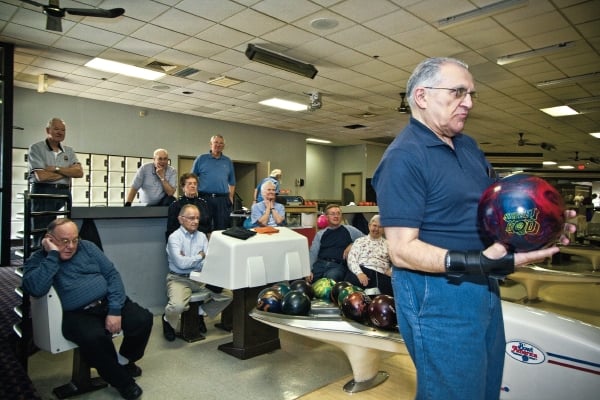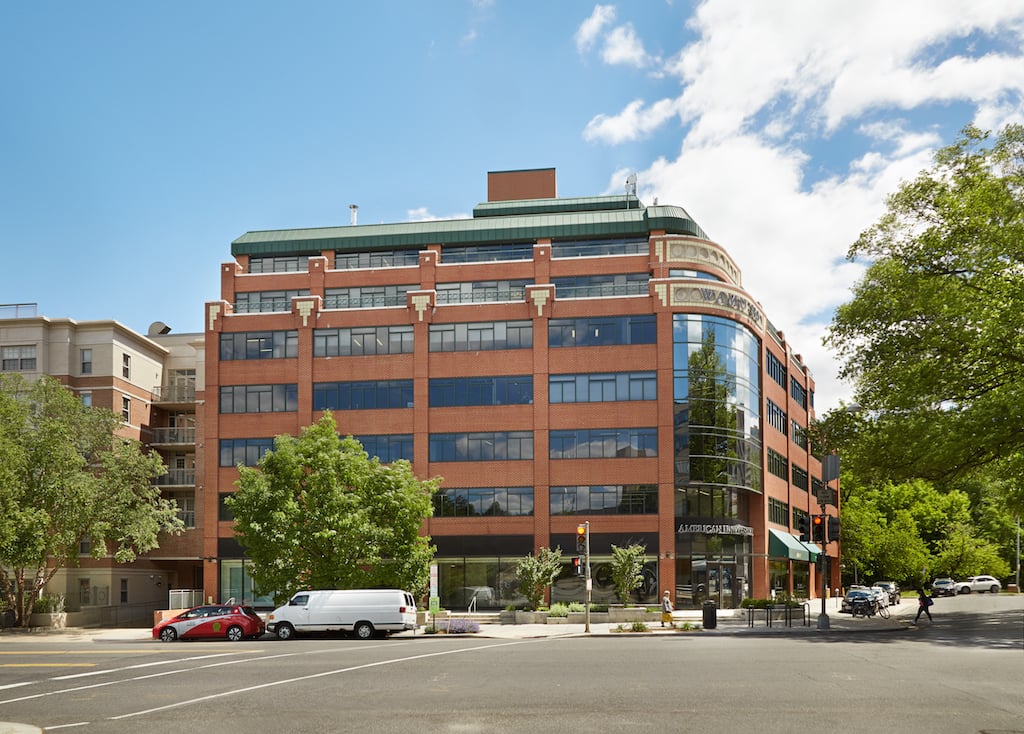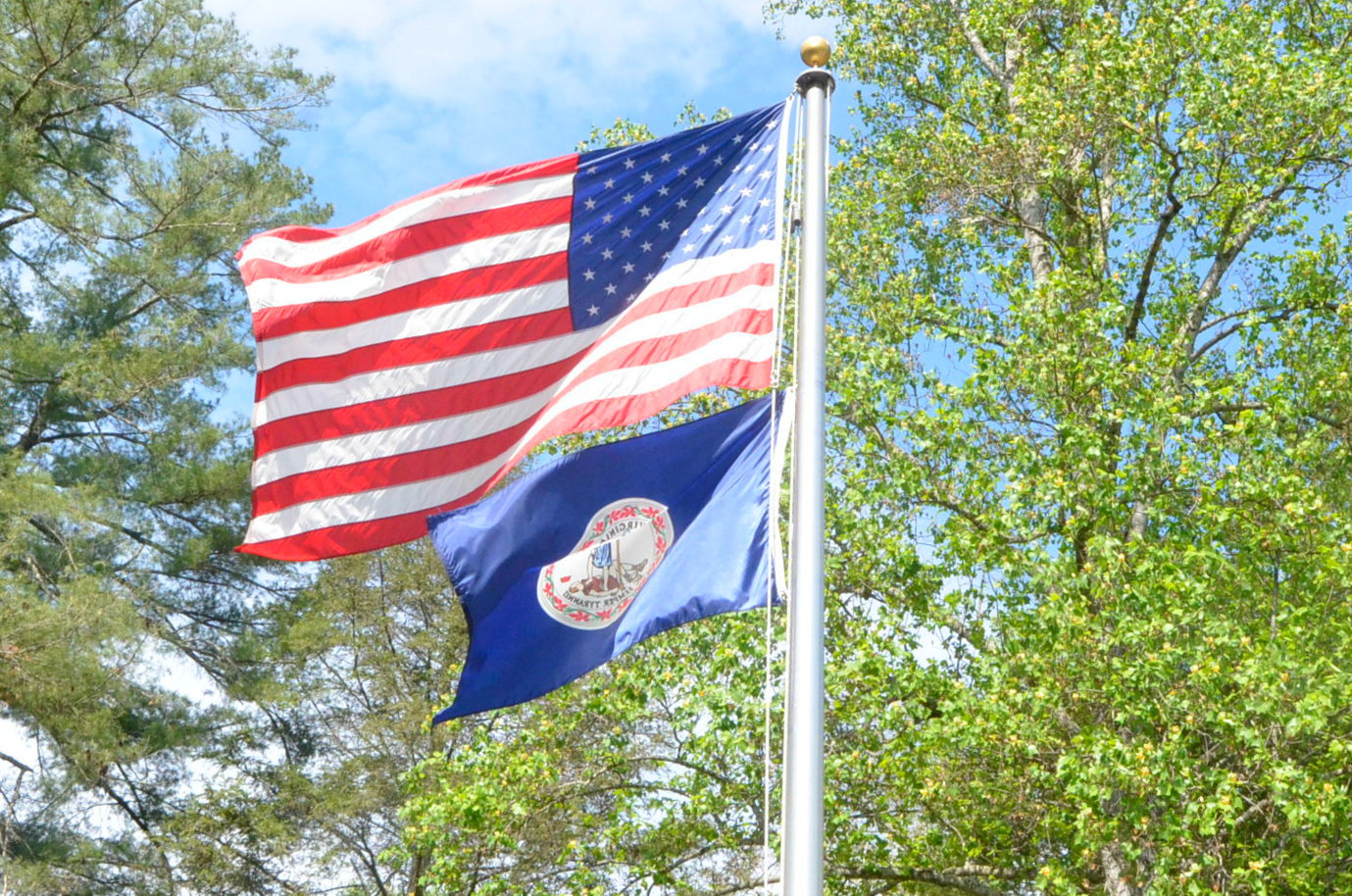All of the lanes at Bowl America in Manassas are taken. Players cheer teammates, jeer rivals, polish bowling balls, and powder their hands before stepping up to the line. It’s like any other league night—but it’s 10 in the morning on a Wednesday.
Nearly 100 Heritage Hunt residents take part in the adult community’s three bowling leagues. With about 90 other area seniors, they’ve formed 60 teams.
Forget shuffleboard and bridge. Doing everything from dancing to participating in charity walks, members of active-adult communities gain a lot from a sense of connection and regular physical activity.
“You’ve got all degrees of bowlers,” says “Sully” Sullivan, 80, president of the Monday league. “You’ve got people who’ve never picked up a ball, and then you’ve got people bowling an average in the 200s.”
Other retirement communities, such as Cameron Grove in Upper Marlboro and the Four Seasons at Historic Virginia in Dumfries, have formed bowling groups. For many, leagues offer an opportunity to become reacquainted with an old pastime.
“The last time I’d bowled in a league was in 1962,” says Wednesday-league president Al Stearns. “Since we are a handicap league, it doesn’t matter if you don’t bowl well.”
Stearns, 73, cofounder of the Heritage Hunt leagues, says weekly meets give residents an opportunity to get to know neighbors. Women account for half of the players. “They think that they’re dominant, but we put them in their place,” jokes Barbara Tarmy, 66.
Although Tarmy’s troupe is ranked next to last among the 16 Wednesday teams, the group is far from disheartened. “We have to hold up the whole league—that’s why we’re on the bottom,” says Meg Bencivenga. “It’s so much more easygoing in senior leagues. We’re in it for the fun. We’re here to enjoy the people.”
Bencivenga, 71, who bowls in two of the leagues, used to play on Friday nights with her son. She has discovered, to her pleasure, that senior bowling starts earlier and has fewer smokers.
Although bowling isn’t particularly vigorous, Sullivan says it keeps his limbs flexible, which helps with his arthritis.
The reward in doing athletic activities at Heritage Hunt, such as yoga and Pilates as well as hiking in groups, has little to do with competition. “We do the exercise and burn the calories so we can do lunch,” Bencivenga says. “You always feel better when you’re out with people, not sitting at home.”
At Chestnut Oaks in Fort Washington, “a lot of our residents love to dance, and that’s a huge form of exercise for them,” says Tammi Miles, executive director of community operations. “It’s hard to keep them still.” Chestnut Oaks started hosting dances even before it opened in 2007.
Glenita Ray, 57, moved to Chestnut Oaks in October. After a stroke caused partial paralysis, she has been limited in her physical activities. “I loved to dance even before I had the stroke, and now I get to do it again,” she says. “There’s health benefits as well because I am getting some exercise.”
And the single retiree welcomed the social opportunities: “Now because all I have to do is get on an elevator and go down to the terrace level, I have a social life again.”
The Four Seasons at Historic Virginia and Spring Hill in Lorton also offer ballroom-dance classes. Line dancing is popular at Cameron Grove and square dancing at the Regency at Dominion Valley in Haymarket. The hand-dancing club at Central Parke at Victoria Falls in Laurel is run by a resident and meets weekly.
In addition to the dances, seniors at Chestnut Oaks and around Fort Washington can attend weekly line-dance and hand-dance classes at the YMCA Potomac Overlook. These classes are part of the Zesty Trailblazers program for seniors at the Y.
The YMCA cosponsors spring and winter dances, or Boogie Woogies, at Chestnut Oaks. “The Boogie Woogie gives the line-dancing classes a chance to come together in a social setting and exercise their skills,” says senior-program coordinator Theresa R. Harris.
With nearly 90 percent of the residents at Chestnut Oaks single, few residents arrive with a partner.
“Even though there were some single females there, you didn’t have many songs go by where you didn’t have a partner,” Ray says. “It was just like a high-school dance: They would come up to you and ask.”
And just as in high school, these dances are the talk of the community. “The next day they always come in and talk about this guy and that guy,” Miles says. “It keeps them really young at heart. It keeps them active.”
The Nintendo Wii gaming console offers video tennis, golf, and bowling that require players to move as if they’re actually playing—without overexertion. “The Wii game is becoming very popular,” says Nicole Hamilton, assistant manager at the Evergreens at Columbia Town Center. Residents “have tournaments for bowling, baseball—they love it.” The Gardens at Fair Oaks in Fairfax, Leisure World of Virginia in Leesburg, and Friendship Terrace in DC also have Wii gaming consoles for residents.
At the Evergreens, Wii tournaments usually draw 10 to 15 participants—but Hamilton says that even if it’s just two people playing, residents passing by will join in. The Evergreens, which also offers yoga and aerobics classes, bought a Wii after officials noticed its popularity at other retirement communities.
Though video games have traditionally catered to young people, Evergreens residents had no trouble becoming skilled players. “They just show each other how it works, and they caught on quickly,” Hamilton says. “When they’re playing the game, they’re standing up, they’re moving their arms, they’re laughing.”
Exercise mixes with charity at the Four Seasons at Historic Virginia. Since 2004, the community has taken part in a 5K each fall, raising money for organizations such as the Alzheimer’s Association and the Arthritis Foundation.
For Barbara Parker, 55, last year’s Prince William County Arthritis Walk was more than a leisurely stroll. Having had juvenile-onset rheumatoid arthritis since age ten, “I basically challenged myself to see if I could raise a significant amount of money for the cause and actually walk in the event.” Thirty of her neighbors at the Four Seasons walked and raised nearly $5,000.
Residents choose a charity to support this way every year. Each 5K—with a few residents doing one- or two-mile variations—has attracted 35 to 55 neighbors. “The turnouts tend to be greatest for the charity-sponsored activities because people want to feel like they are helping others,” says Four Seasons fitness director Kathy Byron.
Veteran jogger Chuck Wilde also takes part in the charity run/walks. Wilde, 65, is a retired naval officer who works at a Springfield environmental-research company and has been a runner since 1978. “My age group doesn’t do a lot of running,” he says, noting that knee problems can make it hard—though he jogs in the 5Ks.
Another avid runner, Nancy Weis, started jogging 15 years ago. “When I wanted a cigarette, I would go walk around the block,” she says. Weis, 72, now does a combination of walking and jogging five days a week. “I have a couple of friends with me on a regular basis,” she says. “We leave the house at a designated time, do our route, then stop at the clubhouse and do a workout class, then finish the designated route.”
Charity run/walks are a great way to bring the Four Seasons’ most active residents, such as Wilde and Weis, together with beginners like Parker. Aside from these annual events—this fall, residents will walk for the Lymphoma Research Foundation—Four Seasons residents have access to a variety of fitness classes including tai chi, arthritis aquatics, and Jazzercise. Wilde hopes the charity events “encourage people to get out, to use the facilities in the clubhouse. They enhance the overall activity level, and that can’t be bad.”
Charity sport activities could prove a growing trend at retirement communities. Each year, Heritage Hunt hosts the Heritage Charity Golf Classic, which also includes a Walk for Cancer.
For seniors, staying physically active not only benefits their health but strengthens their ties to neighbors and friends. Says Byron: “I think when you’re someone who takes care of yourself, you tend to be willing and able to take care of others.”
This article first appeared in the March 2009 issue of The Washingtonian. For more articles from that issue, click here.


















